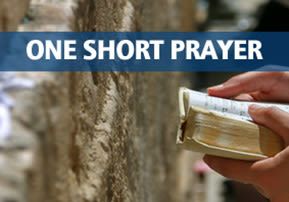
One Short Prayer
Hashem sent Moshe the gift of anxiety, and self-persecutory thoughts in order to help him to see the silliness of serving himself and not Hashem...

Moshe is a 25 year old, married, Yeshiva student who requested clinical hypnosis for his symptoms of anxiety. An intelligent person – Moshe was aware that the source of his anxiety came from the improper way that he was learning Torah. Instead of learning in order to give pleasure to Hashem, Moshe was learning to give pleasure to himself. Instead of appreciating that Hashem gave him a good mind in order to make a huge contribution to the world; Moshe was learning in order to achieve fame for himself.
Moshe left Hashem no choice. Hashem would not let Moshe just throw away the valuable talents that He had given to him. Hashem had to show Moshe that there was something much better than running after his own honor. Hashem sent Moshe the gift of anxiety, and self-persecutory thoughts in order to help him to see the silliness of serving himself and not Hashem.
I asked Moshe: What good would hypnosis do without basic emuna? How would even profound relaxation help him if he continued to think about his situation in the same self-defeating way? Moshe understood this intellectually but was still frightened that by relinquishing his wish for honor that he would not want to learn at all. He was frightened that he would become the stereotypical Breslever – "who accomplishes nothing in learning because he is too busy dancing with emuna like a simpleton in the street." Moshe was inconsolable. He knew that he desperately needed emuna but actually feared it would destroy him. He wanted to trust me as a representative of the Truth – the teachings of the tzadikkim – yet he could trust nobody except himself. What was he to do? Fortunate for Moshe, there was no  one for him to speak to about this. Hashem arranged it so that he would not listen to me or anyone else.
one for him to speak to about this. Hashem arranged it so that he would not listen to me or anyone else.
I expressed my sympathy for Moshe's pain and told him that I was sorry that I would not be able to help him. When we said good-bye, Moshe was even more confused about what to do. He was agitated and even angry that he was in this predicament. He was certainly not at all happy with his lot. He reluctantly made another appointment not knowing if he would even keep it.
The next day, Moshe left me a message that he was canceling his appointment but that he wanted to discuss it with me. He called me repeatedly but I could not answer because I was on the phone with someone else. When we finally were able to speak Moshe told me that he was feeling absolutely wonderful. I could hear it in his voice. He sounded like a different person. His speech was slower and less pressured. His mood was more elevated. His outlook was positive and hopeful. What had happened to Moshe overnight?
Moshe sincerely regretted having exchanged Hashem for his fantasies of grandeur. He spent a good part of the night learning about emuna with a study partner at his Kollel (Yeshiva for married men). I was very happy for Moshe and I told him so. He asked if he needed to continue speaking with me about emuna or if continuing on his own would be enough. I told him that he sounded great and seemed to be on the right track. He did not need to speak to me again.
What happened to Moshe? What brought him to sincere teshuva (repentance)? Moshe had been to several Rabbis and a famous Orthodox psychiatrist before coming to me. Ironically all of them had given him the same advice that I did – to strengthen his emuna. So why did Moshe not have a change of heart back then? Why did he only become serious about trusting Hashem after speaking with me? The answer can be found in the following story: There was a man who lived at the time of the great Baal Shem Tov. The man had heard from somebody that the Baal Shem Tov had a segula (spiritual remedy) for a certain ailment that involved mixing certain spices or herbs together. The man mixed the substances and took them but it did not work. He went to the Maggid of Mezuritch (another tzaddik) and asked why the remedy had not worked for him since he had been careful to prepare the remedy in the proper way. The Maggid told him that his mistake was in thinking that the segula, the remedy was what was helpful. What was helpful and curative was not the remedy at all, said the Maggid – what was curative was that the Baal Shem Tov had told someone to do it and that person had listened to what the Baal Shem Tov said. This man had heard that there was a remedy, but he had not received it from the Baal Shem Tov himself. He had not connected himself directly to a tzaddik.
Before I spoke with Moshe, I said one short prayer to connect myself to the true tzaddikim of our generation and previous generations. That prayer caused the advice that I gave to Moshe to actually come – not from me – but from the Holy mouth of Rebbe Nachman of Breslev – who sent it down to his chief disciple in this generation – Rabbi Shalom Arush, Shlita – who put it into my mouth for Moshe to hear. Any one of you could have done the same thing. Moshe had a true spiritual awakening because he listened to the powerful life-saving words of my Rebbe – he needed nothing more than that.










Tell us what you think!
Thank you for your comment!
It will be published after approval by the Editor.